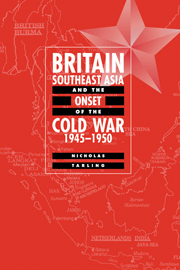Book contents
- Frontmatter
- Contents
- Preface
- List of abbreviations
- Maps
- 1 Wartime Plans for Post-war Southeast Asia, 1942–1945
- 2 Southeast Asia after the Japanese Surrender, 1945–1946
- 3 The Re-establishment of Colonial Régimes in Southeast Asia, 1946
- 4 Concession and Conflict, 1947
- 5 The Impact of Communism, 1948
- 6 Commonwealth and Colombo, 1949–1950
- Personalia
- Notes
- Bibliography
- Index
5 - The Impact of Communism, 1948
Published online by Cambridge University Press: 05 August 2012
- Frontmatter
- Contents
- Preface
- List of abbreviations
- Maps
- 1 Wartime Plans for Post-war Southeast Asia, 1942–1945
- 2 Southeast Asia after the Japanese Surrender, 1945–1946
- 3 The Re-establishment of Colonial Régimes in Southeast Asia, 1946
- 4 Concession and Conflict, 1947
- 5 The Impact of Communism, 1948
- 6 Commonwealth and Colombo, 1949–1950
- Personalia
- Notes
- Bibliography
- Index
Summary
Western Union
In Europe Britain had long been engaged in squaring circles. It was necessary to call the new world in to redress the bank balance of the old, but that had its price. In seeking to maintain its independence, it must also lose it. A power that wants to retain the status quo as far as possible, but is no longer in a position to maintain it all, has to make choices. The US was a better choice than Germany pre-war. The US was a better choice than the Soviet Union post-war. The years 1947–48 marked a further stage in the apprehension of the Soviet threat. Britain took the lead in western Europe, promoting Western Union, but with the aim of involving the US, though also gaining leverage.
Following the failure of the Foreign Ministers' conference on Germany, Bevin finally abandoned any hope of serious negotiations with Russia. ‘His own idea’, he told Marshall on 17 December 1947,
was that we must devise some Western democratic system, comprising the Americans, ourselves, France, Italy etc. and of course the Dominions. This would not be a formal alliance, but an understanding backed by power, money and resolute action … If such a powerful consolidation of the West could be achieved it would then be clear to the Soviet Union that having gone so far they could not advance further.
‘We must … organise and consolidate ethical spiritual forces inherent in this western civilisation of which we are the chief protagonists’, ran the paper Bevin presented to Cabinet on 4 January.
- Type
- Chapter
- Information
- Britain, Southeast Asia and the Onset of the Cold War, 1945–1950 , pp. 263 - 314Publisher: Cambridge University PressPrint publication year: 1998
- 1
- Cited by



